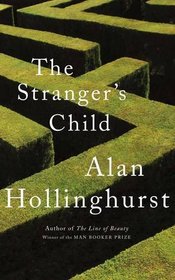Im a little disappointed by The Strangers Child, the latest offering by Man Booker prize-winning author Alan Hollinghurst. Spanning almost a century, the story revolves around Cecil Valance, a minor, aristocratic poet who perishes in World War I. We meet him briefly in Part I as he visits his college friend George Sawle; he writes a poem called Two Acres in the autograph album of Georges sister Daphne that later becomes famous. The story makes four discrete jumps in time, offering glimpses of the Valances and Sawles as Cecils legacy is continuously re-interpreted. I alternate between thinking that the story offers unsatisfactory continuity in the characters lives and that Hollinghurst has a greater message on how time, memory, and shifting perspectives affect the memory of a gay (or bisexual) poet.
The author uses a unique approach to this book. It is written in five parts separated by several years. Primarily, it revolves around the Sawle family. Daphne is a key character for much of the book but recedes to a secondary or supplementary role at other points. She is the younger sister to George who falls in love with a would-be poet, Cecil Valance. Cecil is wealthy and lives by his own standards. Whether or not he loves George is a question as he seems to have affairs with almost anyone who is interesting to him, perhaps even Daphne, who has a crush on him. When Cecil is killed in WWI, his poetry becomes popular even though he is viewed as a second-rate poet. Daphne's older brother, Hubert, dies in WWI, too, but little is seen of him until the last section. Daphne marries Cecil's younger brother, Dudley, who has lived in Cecil's shadow as he grew up. Cecil's influence on the characters of the books is a thread that continues to almost the end. One wonders what life for this family would have been like had Cecil not met and seduced George. It's an enjoyable read where one must fill in the years with what happened using clues from the author and imagination. Who is the stranger's child? You can only speculate as the phrase comes from one of Cecil's poems.
terrible. It's as if making the characters gay would instantly make everything interesting; it doesn't. It was painful to listen to the entire book.




